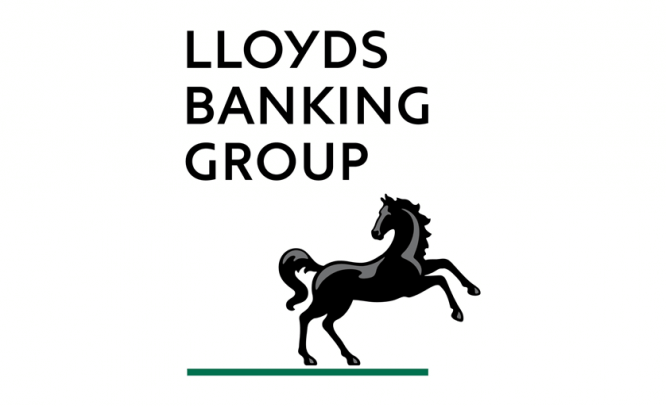Britain is keen to start selling its 20 billion pound holding in Lloyds this year, and top investment banks of the world will pitch for the job of handling the sale by a Treasury deadline on Monday.
July 09, 2013 : Shares of Lloyds Banking Group jumped to 2 ½ year high on Monday as overseas investors stepped up their interest in buying part of the bank, with media reports suggesting many investors interested in acquiring half the government’s stake. Mervyn Davies, former chief executive of Standard Chartered is talking to others about forming a consortium to be an “anchor” or corner stone investor in part nationalized Lloyds which the government is planning to sell. Davies is a partner at U.S. private equity firm Corsair Capital. A source from the electronic media reported that a Corsair led consortium of sovereign wealth funds and financial firms could buy up to 10 billion pounds of Lloyds, or half the government’s stake. The U.K government has been receiving a number of responses and enquiries about the sale including enquiries from overseas investors. Media reports said the Corsair led consortium could buy up to 10 billion pounds or ($ 14.9 billion) of Lloyds or half the government’s stake of 39 percent.
Britain is keen to start selling its 20 billion pound holding in Lloyds this year, and top investment banks of the world will pitch for the job of handling the sale by a Treasury deadline on Monday.
Earlier Britain’s finance minister George Osborne had given the nod for selling of the government stake at Lloyds Banking Group, while the method of sell off is still under consideration, UK Financial Investments (UKFI) will shortlist banks to handle it and narrow down the choices in a later stage. Experts in the industry suggest that one method may be to offer large blocks of shares to professional, institutional buyers, or even, sovereign wealth or private equity funds. Some of the biggest names in international banking were eager to take part; banking majors such as HSBC, Barclays, UBS and Credit Suisse are some of the banks which would be interested to buy the government holding of Lloyds Banking Group.
Lloyd’s shares went up by 2.8 percent at 66.4 pence, after hitting 66.6 p, their highest level since February 2011 and comfortably above the 61.2p level which the government considers as the breakeven price.
Gary Greenwood an analyst at Shore capital said “Given the shares are trading at a premium to what the government paid and the capital position seems to be where it needs to be and the signs of improvement in the UK economy, everything seems to be moving in the right direction he said”.
The potential privatization of the banks is likely to be highly contentious, as local politicians and analysts continue to battle over what to do with British tax payer’s stakes. Lawmakers in Britain suggest the shares to be sold directly to the retail customers to allow them to benefit from any potential increase in the firms future share prices. A similar process in the 1980’s led many British tax payers to buy shares in former state owned companies like the energy utility British Gas.
Investigation on RBS sell off ruled out
Decision on the selloff of the 81 percent tax payer owned Royal Bank of Scotland could be delayed as the government has ruled out a broad investigation into whether RBS should be broken up or sold off in smaller components to induce more competition in the banking sector. The parliamentary commission on banking standards has called for a wide ranging review of the structure of RBS, the government is against splitting the bank into smaller components as it feels it would be an additional burden on the exchequer, it also felt it would cause disruptions to its creditors and customers, thwarting much of the good work that the bank has done in the recent past.
While George Osborne has ruled out the splitting up of RBS into “multiple entities” the bank has to hive of its excess branches, failing which it could be disqualified from the European rules of state aid which requires them sell 631 branches.
Labour party pushes for safety of tax payers
The Labour party is demanding the government to explain its stand on the safety of tax payers and also demand that they get maximum out of the deal from any sale of stakes in Britain’s bailed out banks, the party has tabled amendments to the banking reform bill, which is to be debated in the parliament on Monday. If the bill is passed in the parliament the Treasury would be obliged to chalk out a plan which will protect the interests of the tax payer before any sale went ahead. The party is vehemently challenging the government to ensure the interest of the tax payer’s are met in case of sale of banks. The amendments are likely to be implemented before any selloff, particularly in the case of Lloyds. Labour is hoping to put pressure on the government to explain the rationale for any sale. The party has demanded that top High Street banks should be forced to sell off hundreds of branches in a “root and branch” reform of the industry, Shadow Chancellor, Ed Balls told the BBC that the government was “foot dragging” on the issue. The party is of the opinion that the sold off branches should be used to create “challenger’ banks to increase lending and competition among banks. The labour is insisting on creating a more competitive banking system as it feels the present is concentrating on banking “short term trade profits and not focusing on the long term”

